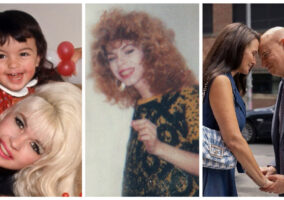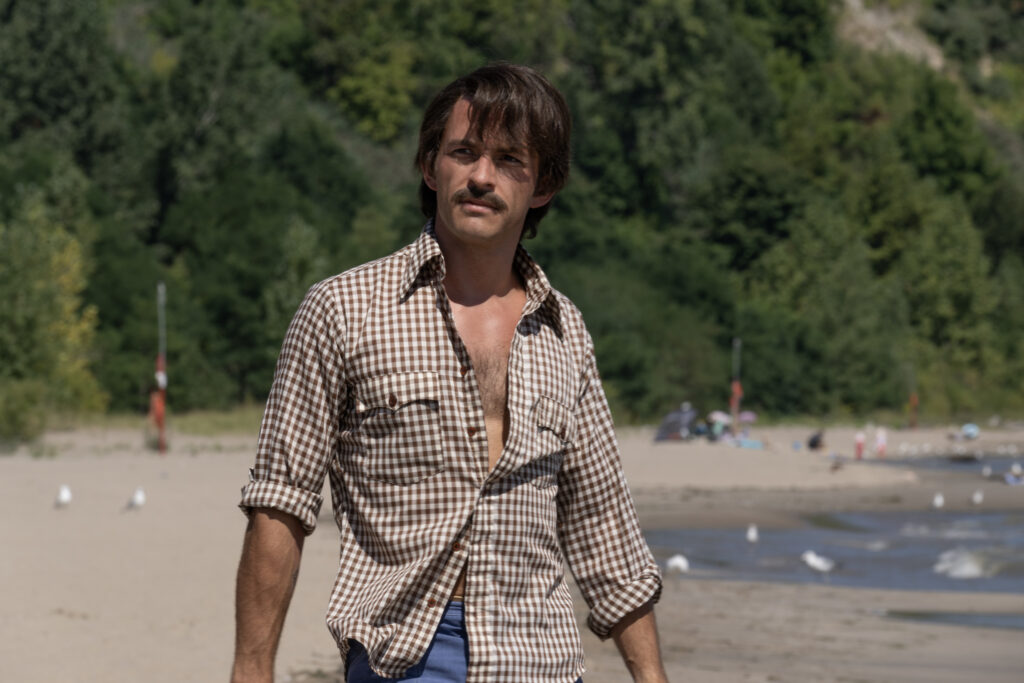 Fellow Travelers hits its home stretch of episodes, rehashing a few things that didn’t need rehashing, remembering characters it shouldn’t have forgotten, and returning to an era we thought it had left. But despite some rocky parts and some questionable creative choices, the series ends on a weepily beautiful note.
Fellow Travelers hits its home stretch of episodes, rehashing a few things that didn’t need rehashing, remembering characters it shouldn’t have forgotten, and returning to an era we thought it had left. But despite some rocky parts and some questionable creative choices, the series ends on a weepily beautiful note.
It’s 1979 and the new era of Gay Liberation is in full swing. After a decade of organized marching in the streets and the occasional pie thrown in Anita Bryant’s face, the queer community is feeling celebratory and powerful, which is why the murder of Harvey Milk hit it so hard. At the Castro Mission Health Center in San Francisco, Frankie (in a truly horrific wig) is watching the news reports about the upcoming verdict in the case. Tim, having evidently done his time in prison, is also working at the health center and is pondering a card Hawk sent him from Fire Island, begging him to come. Things are looking quite different for our characters since last we checked in on them. Frankie is angry that Tim would consider leaving the city when all hell is about to break loose, and also more than a little judgmental about him holding a torch for Hawk.
Tim calls Lucy, who is lecturing her pregnant daughter on self care while getting in little digs about her absentee father. She is cold but polite to Tim and tries to rush him off the phone, but he tells her that Hawk keeps calling him late at night when he’s drunk. She reveals that she gave Hawk an ultimatum two months ago and he chose to continue drinking rather than stay with his family. Tim says he’s in trouble and that he wants to see him. She simply notes the irony of him asking her permission and agrees that her husband is in trouble before hanging up. Her daughter listens in on the whole thing. We keep writing “her daughter” because this character has been so undeveloped and incidental up until now that we don’t even know her name. We’re not lazy-asses, however. We looked it up. It’s Kimberly. We realize she’s appeared throughout the series, including in its opening scene, but so much of the wrapup of this story seems to rest, at least momentarily, on her reactions to it, and she’s been a complete stranger up until now.
Tim arrives at a badly green-screened version of the Fire Island Pines, where Hawk is doing poppers while getting a blowjob and listening to disco. While you could argue that this scenario hits just about every cliche about the time and place you can think of, not one of them could be considered inaccurate. Tim stands out from the other gay men in the house because he’s sporting the quintessential Castro Clone look of the period, while the rest of them are wearing the dressing gowns, speedos and nothing all that the setting requires. The other men tease him for dressing like a lumberjack or a lesbian before turning on Hawk and teasing him for preferring to be called a homosexual rather than gay. It’s a subtle point about how men on the down low tend to see themselves as disconnected from the gay community, but it’s also indicative of Hawk’s generation and age, the latter of which is not particularly evident. As a World War II vet, Hawk is supposed to be nearly 60 years old in this episode. It’s a genuine shame that a series like this, telling a decades-long story encompassing the entire 20th Century history of LGBTQ life, never once touches on the rampant ageism that tends to define queer male social life past the age of 40 or so. Sure, Hawk’s rent boy lover sneers at his inability to get it up, but that’s about it. By insisting on keeping the extremely good-looking, anachronistically fit (to a certain extent), and decades younger actors in the lead roles, the series has done itself a disservice. It’s hard to see Hawk as a rock-bottom near senior citizen when you have Matt Bomer flashing his pecs and unlined face in the role. It’s hard to see Tim as a somewhat melancholy middle-aged man when you’ve got the bright-eyed Jonathan Bailey and his ripped abs in the role. It’s not just that the aging makeup is poorly considered (if not downright nonexistent), it’s the insistence on keeping the two leads as undressed as possible for as long as possible in every episode. We thank them for their service, but it takes us right out of the story. It’s only made more obvious by the show’s structure, which constantly has it bouncing back and forth across the decades, with little more than fashion or hairstyle cues to let us know when we are, because the actors all look exactly the same.
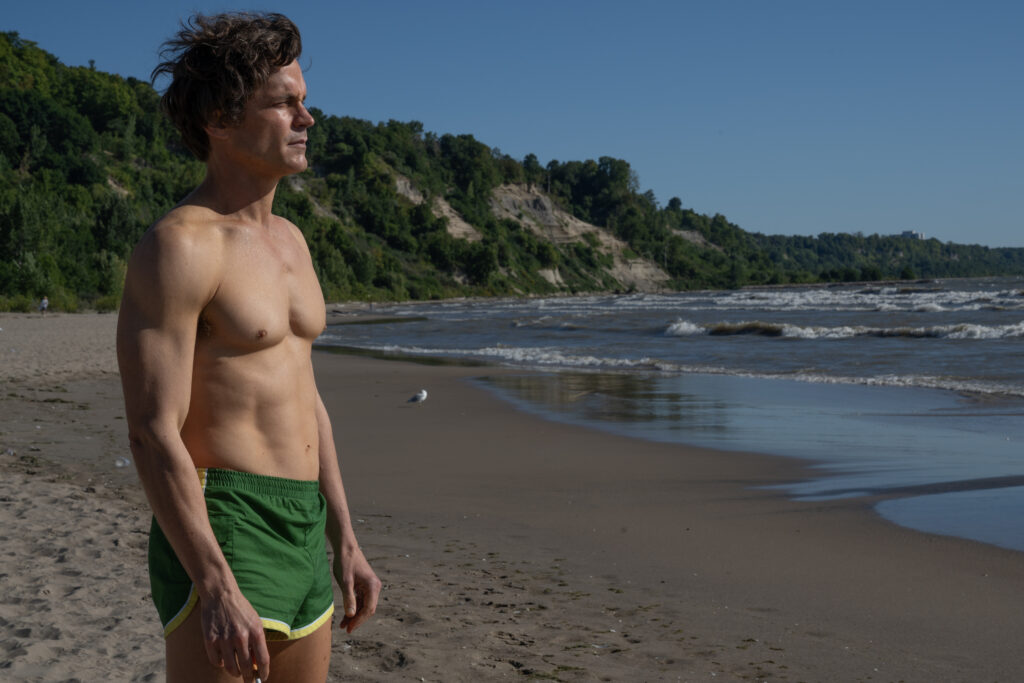
Tim finds himself repeatedly facing off against Craig, Hawk’s big blond boy toy; not just for obvious reasons but to show what it’s like to be gay and face a different an unfamiliar element of queer male socializing. Tim is largely pegged as an oddity and an outsider by the others because he comes from a gay mecca far different than Fire Island: San Francisco. We don’t know if we’re prepared to agree with the observations made here, but the series is doing a fantastic job of demonstrating how different gay enclaves across the nation produce different gay men. Washington is full of conservative careerist queers, San Francisco is where all the queer liberation politics happens, and Fire Island is the bitchy, shallow, drug and sex fueled escape from all of it. It’s rare to see those kinds of queer cultural differences (which are, to be fair, not nearly as big a thing as it was in the past) depicted with such nuance. Anyway, Hawk is drinking himself sick while Tim and Craig spit bitchy remarks at each other, the latter genuinely unnerved to find out that Hawk’s son had died and he never mentioned it.
Back in San Francisco, Marcus is teaching journalism and still deeply conflicted about publicly admitting or expressing his gayness, even though he’s been in a relationship with an apparently very patient Frankie for well over a decade. We find out that he first met his foster son Jerome when he was struggling as his student, living on the streets. They don’t exactly hit it off. Jerome is mad at him for not shutting down a class homophobe and Marcus really doesn’t have a response for him. Back at home, things are pretty bad between him and Frankie and it’s revealed during an argument that he cheated on him a lot.
Back on the beach, Hawk is flashing his ripped abs and telling Tim how he runs and swims every day, which is, we suppose meant to explain why he’s so jacked while shitting out his guts from drinking too much but we have a hard time buying it. He thanks Tim for coming to see him. The flirting begins and eventually, they find themselves in the Meat Rack, as all must at one time or another in The Pines. It was actually a nice little sequence, distinguished by its reverence and lack of salaciousness. At dinner that night, Tim tells him that he came completely out of the closet, to his family and everything. Hawk says he’s no good for his family and starts giving the impression he wants to make up for lost time with Tim. He tells him he wants to put the Fire Island house deed in Tim’s name, essentially so they can have a fuckpad where they meet up a few times a year. Tim doesn’t react well to the idea that Hawk still wants to make him his side piece and tries to get him to talk abotu Jackson, but Hawk calls him a self-righteous bore. With the help of some coke and shots, Tim eventually loosens up, but it didn’t come off like freedom so much as jealousy, especially since he wound up in a three-way with Hawk and Craig. Things go badly because Craig left a picture of Jackson on the nightstand, causing Hawk to go berserk and threaten to kill him.
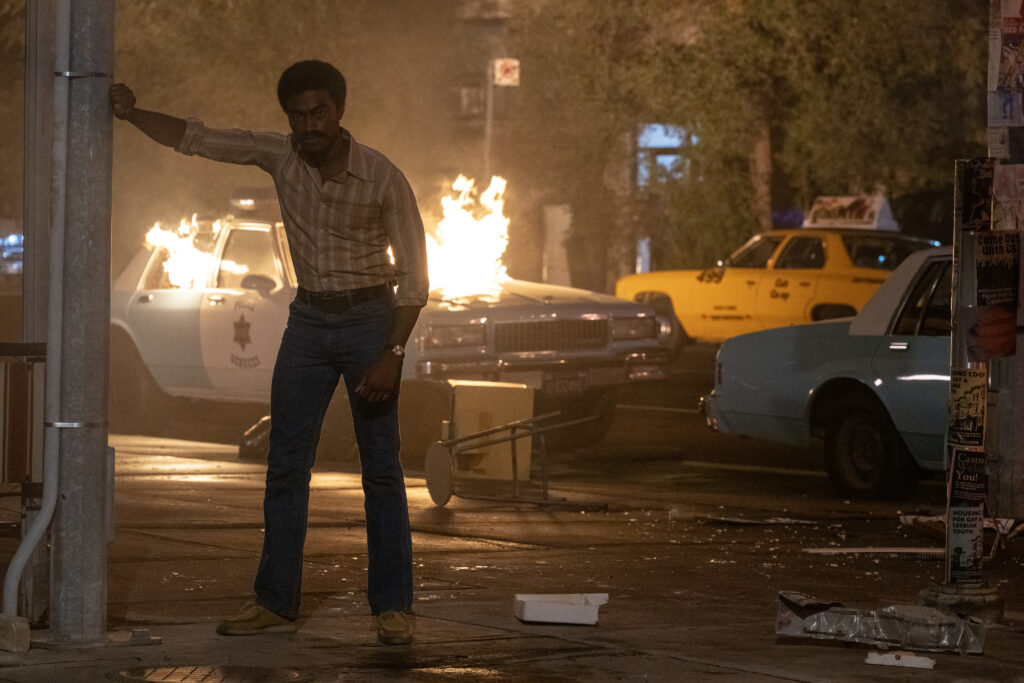
In San Francisco, Dan White gets off for murdering Harvey Milk and the streets explode in anger, Marcus and Jerome get caught in a violent police raid and eventually meet up with Frankie. Marcus joins them in jeering at the cops and kisses Frankie in front of them. Meanwhile, in D.C. Lucy all but tells Kimberly the truth about her father.
Hawk finally opens up about Jackson’s death to Tim, who implores him to go back to his wife and daughter because they need him. “Don’t you need me, Skippy?” “I have you,” he replies. Unfortunately, the moment doesn’t last. The next morning, Tim finds Hawk doing lines again and storms out, declaring himself finally free of him. Hawk eventually breaks down and calls Kimberly to tell him he’s coming home. Back in San Francisco, Tim attends a vigil for Harvey Milk organized by Cleve Jones, who would go on to become so inspired by this night of solidarity that he eventually envisioned the AIDS Quilt.
In 1986, Hawk receives a call from Lucy informing him that she’s in San Francisco, all plans for moving abroad are on hold, and she needs to talk to him. Hawk tells Tim that she asked to meet with him and Tim notes that Hawk’s drinking again. Marcus tells Hawk that Jerome is positive but that he won’t admit it to him. Hawk gives him some parenting advice about how to deal with boys who have secrets. We’d have liked a version of this series where Marcus’ life and choices received the same weight as Hawk’s, but we’re in the final hour of the story and it all still feels somewhat tacked on. We know everything there is to know about Hawk’s life, but we only get occasional glimpses of Marcus’ and so much of it feels undeveloped.
We’re back in the 1950s and we have to admit, we got a little frustrated to see it. The pacing was always off in this series, largely because it tried to tell a story spanning decades but spent the vast majority of it stuck in a few years in the early fifties. This time, it’s 1957 and Hawk is meeting up with Tim in Washington after receiving a telegram from him imploring him to do something about the Hungarian refugees in the wake of the Soviet invasion. Hawk sets him up with a job in the refugee relief office of the State Department and tries to re-ignite things between them, but Tim won’t have it. He meets with Mary for lunch and we’re afraid we have to once again complain about how the show treats characters on the periphery of its story. Mary was one of the more interesting characters in the early episodes, but once they got one good lesbian scare storyline out of her, she disappeared. We can tell how the show wanted to move away from centering its white male protagonists, but all too often, it only managed to pay lip service to other kinds of queer lives.
In 1986, Lucy goes to see Tim in the hospital and asks the nurse if she should wear gloves on an AIDS floor. Again, this whole scene would have played better if either of these actors looked anything like the age of the characters they’re playing, because the youthful faces and affects of Allison Williams and Jonathan Bailey do a lot to destroy the sense that we’re looking at two senior citizens with decades of regrets and grudges between them. Lucy says that the government should be doing more about this and he retorts that they would, except “people like you would have to pay higher taxes.” She shuts him down immediately. “It’s not always wise to judge someone on appearances.” They spar a little, but you can tell neither of them want to be cruel to the other one. She tells him that she never would have survived Jackson’s death if she’d left Hawk because of his affairs and notices Hawk’s belongings by the bed before she leaves.
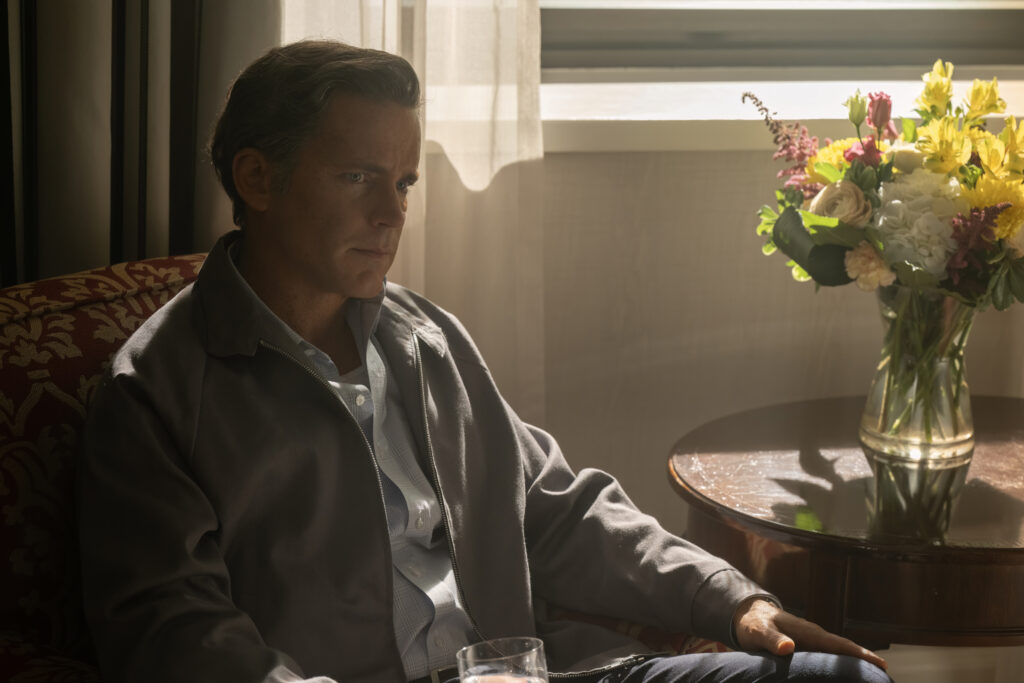
Hawk goes to meet with his political buddy on behalf of Tim, hoping to get a word with the governor about AIDS patient rights. The other guy scoffs at the suggestion of the governor having anything to do with AIDS at all (“Fags with AIDS, who gives a shit?”), prompting a fed up Hawk to remind the guy of his own extramarital affairs and implying that he’d make them known. Between this scene and the Lucy one, it’s clear where the story is heading. At this point, we’re just waiting for it to get there. It feels like we’ve been waiting for a bit too long.
Back in 1957. Hawk rescues Tim from McCarthy’s funeral and brings him back to his crashpad, where he gets to do “the things men like to do when they’re alone.” Tim is skeptical, but Hawk swears he’s “the epitome of marital fidelity.” It’s clearly not true, but when Tim tries to judge him for it, they wind up fucking instead. Hawk bottoms. While the scene is hot, all of this feels incredibly repetitive and overstated. There’s no reason for the story to return to this period so late, after already spending so much time there. Tim tells him that he’ll meet him whenever he wants and that he won’t make any trouble because he no longer has any expectations of him. Back at home, Lucy notices the massive, “there’s only one position this could’ve happened in” love bite on his back.
1986 again. Hawk arrives at Lucy’s hotel room. It goes exactly how you thought it would. At the hospital, Tim fades in and out. “I’m disappearing a little every day.” Hawk takes him home and tells him to get a tuxedo because he’s meeting the governor.
1957. Hawk and Tim are dancing nakedly when Tim points out that they’ll be work colleagues once his job is approved. Hawk looks disturbed by the prospect of Tim being that entrenched in his daily life. At home, Lucy informs him of a slight scare regarding her pregnancy and pointedly notes that he wasn’t around to deal with it. Sensing that his carefully cultivated lie of a life is being threatened, he reverts to his old sociopathic ways and reports Tim to the M Unit for perversion, barring him from ever working in the federal government again. This reveal is ostensibly why the timeline has been so segmented and random throughout the series, but we don’t think withholding this betrayal until nearly the last minute was worth it.
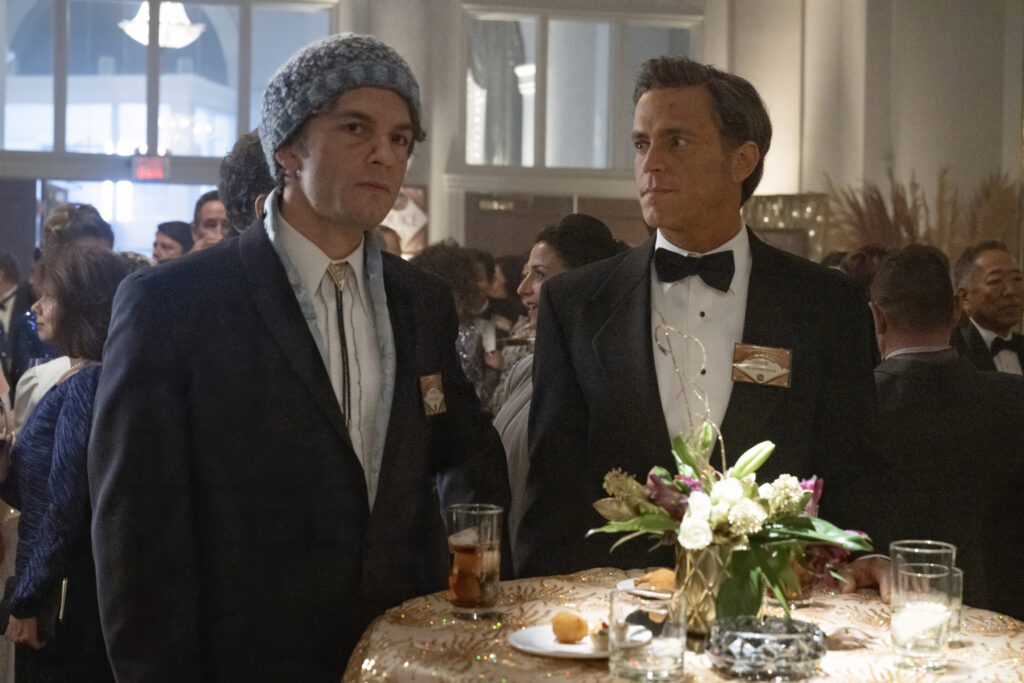
1986. Hawk’s colleague blows him and Tim off at the Governor’s dinner. Hawk admits his relationship to him, although in a very whispered and vague manner. Still, it’s a big deal, given how much damage he’s caused over the years trying to keep that secret. He goes outside to apologize to Tim for just about everything he ever did, when Tim stops him and tells him that he was the great “all-consuming” love of his life. They kiss, in public, “and the world didn’t end,” Tim notes. Marcus shows up and reveals that they decided to use Hawk’s invitation to the dinner to stage a little ACT UP-style protest and Tim goes out fighting, after sending Hawk home one last time. Unfortunately, no one is waiting for him at home anymore.
Now it’s 1987. Hawk and Kimberly visit the first display of the AIDS Memorial Quilt on the national mall. He finds Tim’s panel. “He wasn’t my friend,” he corrects his daughter, tears falling, “He was the man I loved.” We may have had some issues with the overall pace, some casting decisions, and how the final few hours of the series shook out, but Fellow Travelers ended beautifully and poignantly.
Thom Browne Pre-Fall 2024 Menswear Collection Next Post:
THE GILDED AGE: In Terms of Winning and Losing
Please review our Community Guidelines before posting a comment. Thank you!


